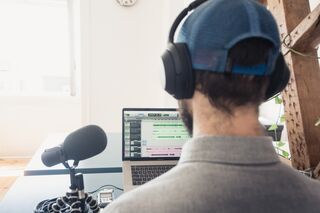Wisdom
Podcasting Educators Share Globally
Educator wisdom reaches thousands, thus helping more students, through podcasts.
Posted August 3, 2021 Reviewed by Ekua Hagan
Key points
- Millions of people listen to podcasts, and many podcasts relate to education.
- Educators can increase their reach through podcasting by getting matched with a podcaster on PodMatch.
- Educators interested in hosting a podcast can create their own and submit it to NPR, BBC, and CBC for inclusion in their national lineups.

An estimated 112 million people have listened to podcasts, 24% have listened to a podcast in the last month, and 86% of listeners finish most or all of the podcasts they hear (Edison Research, 2017). Hosting or being a guest on a podcast allows educators to share their wisdom beyond school walls and reach listeners they would not otherwise meet, thus helping more students.
Podcast interviews are typically held from your own home, where you “phone in” to participate with an interviewer who is physically elsewhere. Thus, the COVID pandemic will not hamper your ability to participate if you are someone with the time and desire to podcast (and if you are not, do not judge those who are; we should be grateful when educators find time in their busy schedules to share strategies and information so more students can benefit, as many are). The fact that so many educators podcast shows us that doing so is possible for some, and we have much to learn from those who find this to be an enjoyable and valuable outlet.
There are a number of ways educators can increase the reach of their ideas through podcasting.
Get Matched With a Podcast
PodMatch is a service that will match you with podcasts (as a speaker) or with speakers (if you are a podcaster) for free. If you go this convenient route, it only takes about 10 minutes to craft a profile that captures what you have of value to share.
Search for a Podcast
For those wanting to skim through all podcasts available, you can Google your area of expertise beside the word “podcast” or “radio” to find broadcasts suited to the knowledge you have to share. You can also download this free collection of electronic resources and open the file called, “List of Broadcasting Opportunities." Sort the file by its “Category” column (by clicking the arrow near the top of the column) and notice the long list of opportunities categorized as “Podcast." Approaching field-specific programs first can offer better acceptance odds and allow your work to reach the most appropriate audience.
Also note opportunities labeled as “Radio Org” in the file’s “Category” column, as producers of broadcasted content reach particularly massive audiences. For example, American Public Media reaches 20 million listeners per week (American Public Media, 2019), and Radiotopia (just one Public Radio Exchange podcast collection) garners more than 17 million downloads per month (PRX, 2017). Getting featured on one of these organizations’ shows allows your student-helping knowledge to reach a large audience, particularly if your ideas hold mainstream relevance (such as how much screen time our brains can manage in good health). Once you select podcasts to approach, send hosts or producers a succinct pitch summarizing your expertise and describing your topic as something of value to their particular listeners.
Create Your Own Podcast
You can also create your own podcast with a free audio editing tool like Audacity. Google create your own podcast and you will find guidance on how this can be achieved.
Before recording, listen to a variety of podcasts to find a style that works for you and your content. For example, notice how Psychology Today blogger and psychologist Dr. Robyn Koslowitz manages to make serious content approachable and enjoyable, while at the same time informative and practical, on her excellent podcast Post-Traumatic Parenting.
Get More Coverage for Your Podcast
NPR, BBC, and CBC all maintain calls for new podcasts. By following those links in the previous sentence, anyone can submit their podcasts for consideration to reach these US, UK, and Canadian national lineups.
Thank You
Being a teacher, principal, counselor, or other educator on the front lines of education takes an immense amount of time and dedication. Though that can also make it hard to find time to share one’s expertise beyond the usual workday, those working the front lines have valuable wisdom to share for the benefit of students worldwide. When educators do find and take the time to podcast, they deserve gratitude and are likely open to answering questions from other educators on how they broke into the practice.
References
American Public Media. (2019). We’re everywhere you listen. American Public Media. https://www.americanpublicmedia.org/about
Edison Research. (2017). The podcast consumer 2017 report [Audio podcast]. https://www.edisonresearch.com/the-podcast-consumer-2017
PRX. (2017). About PRX. PRX. https://www.prx.org/about-us/what-is-prx


